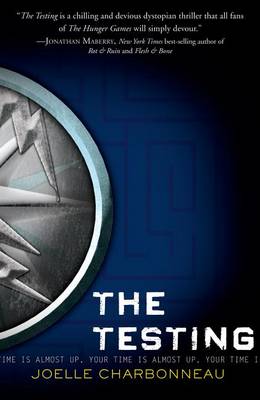Reviewed by Briana @ Pages Unbound on
The Testing has an interesting plot, solid pacing, and intelligent protagonists. If I had not already encountered this plot in several other YA dystopians, I probably would have loved the book. The opening scene is immediately reminiscent of a number of others novels. Featuring a teenage girl going to a graduation ceremony that will determine her future in her dystopian society, it evokes scenes from at least Delirium, Matched, and Divergent. Once Cia is chosen for the Testing, the plot is most similar to Divergent as Cia must pass a variety of tasks to move on in the completion. Finally, the plot mirrors that of The Hunger Games, as Cia and her fellow Testing candidates are dropped off in the wilderness to fend for themselves and kill their competition if necessary. The Testing, of course, puts some unique details on the plot, but the similarities to other YA books are so strong that the story barely seems worth reading for anyone who already has read many other dystopians, particularly Divergent and The Hunger Games.
Even the characters cannot set The Testing apart. Cia, in my opinion, is likeable and I was totally rooting for her. However, her defining characteristic is decency. While this is admirable, one of the many reasons I wanted her to succeed, and a large element in the plot and themes of the novel, it simply does not make Cia the most exciting female dystopian protagonist. Excitement, of course, is unnecessary for a book to be interesting or good, but its presence could really help a book already struggling to differentiate itself from every other book in its genre. The Testing’s attempt to be different from books like The Hunger Game by being a little more “quiet,” emphasizing that good leaders are good people and not just good killers, may actually lead it to become lost in the crowd rather than standing out in it.
Furthermore, beyond Cia’s intelligent and mature discussions of what the ideal Testing candidate (i.e. ideal future leader of her nation) should be like, Cia and her friends are not very dynamic. Everyone chosen for the Testing is smart, but their brilliance inevitably appears commonplace to the reader because no one is lacking in it. In this post-apocalyptic society, it is apparently normal for teenagers to engineer innovative irrigation systems, electrical systems, new plant life, etc. And although the Testing candidates are supposed to have a specialty, most of them appear to be good at everything, and no one is as good at everything as Cia. If she encounters a problem, she solves it in a heartbeat. It might take her time, say a day or two, to execute her idea, but that only involves the practical part of building her brilliant design. The design itself comes to her, unflawed, almost instantaneously, no matter the situation.
The dystopian government of the novel also has some flaws. After finishing the book, I am still asking myself why any of this had to happen at all. Why does the government want candidates to die during the Testing? As Cia observes repeatedly, the Testing committee could easily weed out the “weaklings” without having them actually die. Right now, I, and Cia, can only assume the Testing officials are sick and voyeuristic, but (as I mentioned in my review of Nerve), I never find this type of explanation satisfying.) I also wonder why the Resistance is interested in Cia. So far, nothing special about her has been revealed. Presumably it will be later in the series, but some hints should be dropped so readers do not spend the entirety of book one scratching their heads and thinking so many of the plot elements make so little sense.
The Testing is well-written and has a lot going for it thematically. Cia tackles head-on important questions about her society, what it means it be a good person and a good leader, and what her experience during the chilling stages of the Testing should mean to her and to others. Charbonneau is clearly a thoughtful writer who wants to provoke readers' minds and not just their emotions; she wants to inspire in addition to stimulate. Unfortunately, Charbonneau’s thoughtfulness is packaged in other writers’ plots. The book would probably be incredibly enjoyable to readers just discovering the dystopian genre, but avid fans of it will recognize they have read variations of this book before.
Bottom Line: I would read more of this author’s work, but I am not interested in this particular series.
Reading updates
- Started reading
- 14 July, 2013: Finished reading
- 14 July, 2013: Reviewed
